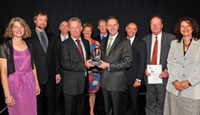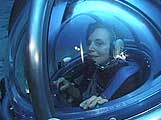 This year’s NZ Prime Minister’s Science Prize — worth $500,000 — has been awarded to a team of scientists working on climate-related issues at the joint Otago University and National Institute of Water and Atmospheric Research (NIWA) Centre for Chemical & Physical Oceanography. The team carried out ground-breaking research on using iron to fertilise phytoplankton growth in the southern ocean, and its effectiveness at removing carbon from the atmosphere. Team leader Professor Philip Boyd commented:
This year’s NZ Prime Minister’s Science Prize — worth $500,000 — has been awarded to a team of scientists working on climate-related issues at the joint Otago University and National Institute of Water and Atmospheric Research (NIWA) Centre for Chemical & Physical Oceanography. The team carried out ground-breaking research on using iron to fertilise phytoplankton growth in the southern ocean, and its effectiveness at removing carbon from the atmosphere. Team leader Professor Philip Boyd commented:
Around the world, there is a growing lobby, which includes influential people like Bill Gates, for using geo-engineering to claw back some of the carbon dioxide humans are emitting. Our research has shown that adding iron to the ocean is not going to be an effective way to do that.
You can hear Professor Boyd talking about the research in episode #6 of The Climate Show, and Professor Keith Hunter, co-director of the Centre was interviewed in Climate Show #16. “It’s the top prize in science in the country and it’s an outstanding award for science at Otago,” Hunter said today. The centre plans to spend most of its winnings on a state-of-the-art phytoplankton culture facility in Dunedin. Other members of the team were Dr Evelyn Armstrong and Dr Kim Currie of NIWA’s research unit, Associate Professor Russell Frew, Dr Sylvia Sander, and Dr Robert Strzepek (all of Otago University), Dr Cliff Law, NIWA principal scientist, and Dr Rob Murdoch, NIWA’s general manager of research.
The 2011 MacDiarmid Emerging Scientist prize was awarded to Dr Rob McKay, a world-leading glacial sedimentologist at VUW’s Antarctic Research Centre for his work using marine sedimentary records and glacial deposits to reconstruct Antarctic climate over the last 13 million years.
The full list of winners is available here. Congratulations to all.

 “We are committed to developing deepwater energy supplies offshore.†Those blunt words from the US Administration were put to oceanographer Sylvia Earle by Stephen Sackur late in a captivating
“We are committed to developing deepwater energy supplies offshore.†Those blunt words from the US Administration were put to oceanographer Sylvia Earle by Stephen Sackur late in a captivating